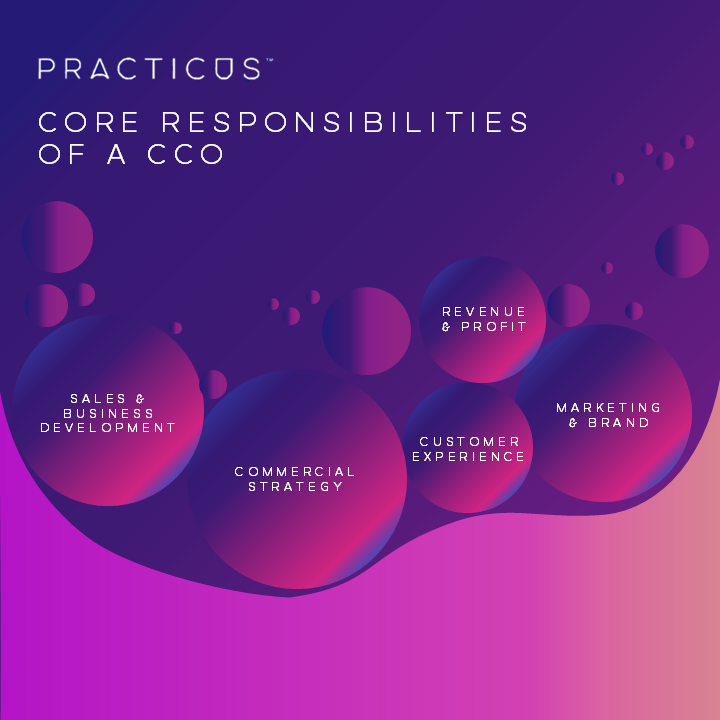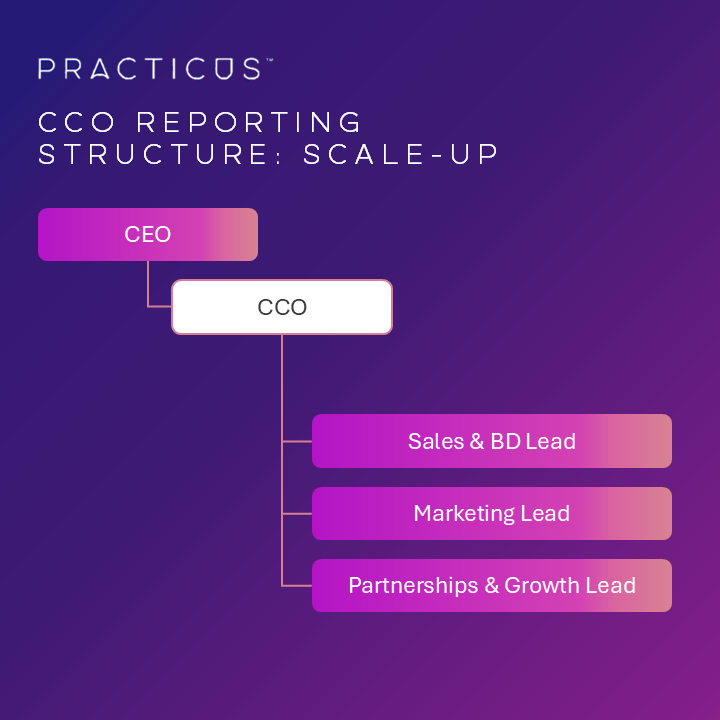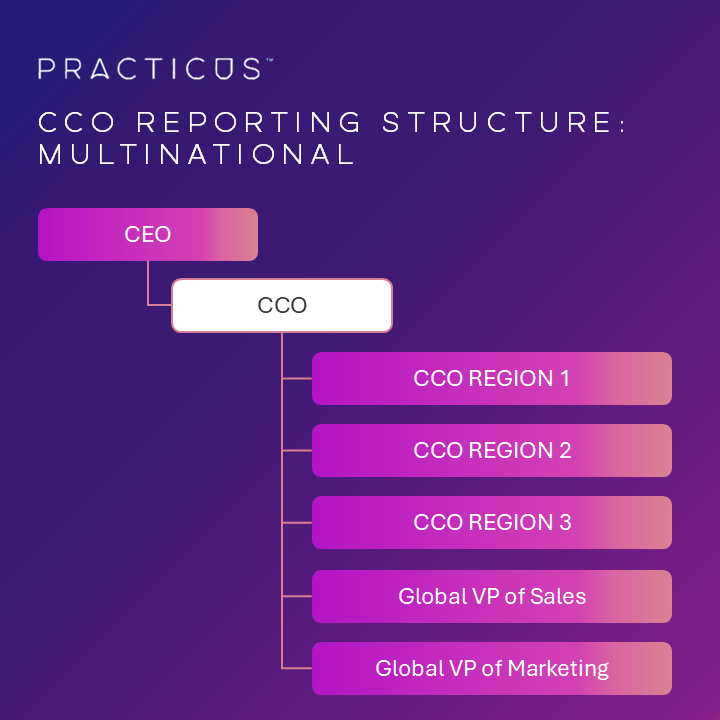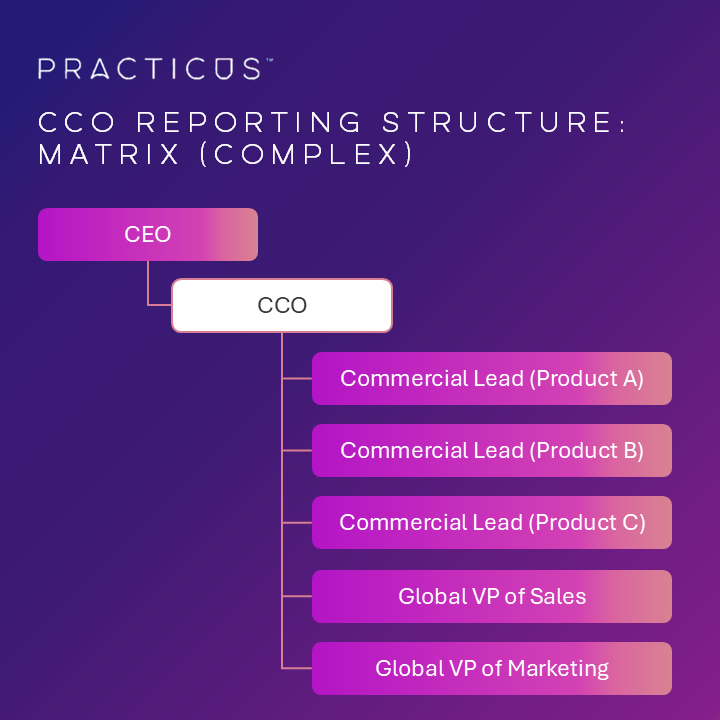A Chief Commercial Officer (CCO) is the driving force behind an organisation’s revenue, growth and market expansion. They sit at the intersection of sales, marketing, business development and customer experience—aligning these functions to create a winning commercial strategy.
CCO core responsibilities
Here’s what a CCO typically takes ownership of:
Developing and Executing Commercial Strategy
- Crafting a comprehensive commercial strategy that aligns with the company’s overall business goals.
- Identifying new revenue opportunities, whether through market expansion, new product offerings or strategic partnerships.
- Keeping a close eye on industry trends, competitors and emerging market opportunities.
Sales Leadership and Business Development
- Setting sales targets and performance metrics to drive revenue growth.
- Overseeing the sales team’s structure, strategy and execution to ensure they deliver results.
- Building strategic partnerships and alliances to unlock new markets and enhance competitiveness.
Marketing and Brand Positioning
- Working closely with the marketing team to ensure commercial goals are reflected in branding, campaigns and digital strategies.
- Aligning sales and marketing efforts for maximum impact—ensuring customer acquisition and retention strategies are seamless.
- Enhancing the company’s market positioning and competitive advantage through effective messaging and brand awareness.
Customer experience and retention
- Ensuring a customer-centric approach across all commercial activities, from sales to post-sale engagement.
- Developing strategies for customer retention, loyalty and lifetime value optimisation.
- Leveraging customer insights and feedback to refine products, services and the overall value proposition.
Revenue and Profitability Management
- Overseeing pricing strategies, revenue models and profitability analysis.
- Managing budget allocations for commercial activities to maximise return on investment.
- Collaborating with the finance team to forecast revenue and ensure commercial targets align with financial health.
Cross-functional Collaboration and Leadership
- Acting as a bridge between commercial functions, ensuring seamless collaboration across sales, marketing, product and operations.
- Reporting directly to the CEO and Board of Directors on commercial performance, market trends and strategic opportunities.
- Leading, mentoring and inspiring teams to drive performance and innovation.
Digital Transformation and Innovation
- Driving data-led decision-making, leveraging analytics and technology to refine commercial strategies.
- Identifying opportunities for automation, AI and digital tools to enhance efficiency and sales performance.
- Ensuring the company remains adaptable and ahead of market disruptions through innovative commercial approaches.
Impact on company success
A CCO’s role is not just about hitting sales targets—it’s about crafting and executing a vision that ensures sustainable, long-term growth. By uniting sales, marketing, customer experience and business development under one strategic umbrella, they drive revenue, market share and customer loyalty.
Ultimately, the right CCO is a powerhouse leader who transforms commercial potential into measurable success.
CCO experience and qualifications
A CCO’s role is not just about hitting sales targets—it’s about crafting and executing a vision that ensures sustainable, long-term growth. By uniting sales, marketing, customer experience and business development under one strategic umbrella, they drive revenue, market share and customer loyalty.
Ultimately, the right CCO is a powerhouse leader who transforms commercial potential into measurable success.
Experience & Qualifications to Look for When Hiring a Chief Commercial Officer (CCO)
When hiring a Chief Commercial Officer (CCO), selecting the right candidate requires a balance of experience, leadership capability and commercial expertise.
Using the MoSCoW prioritisation method, here’s what a company Must Have, Should Have, Could Have and Won’t Have when assessing candidates.
🟢 Must Have (Essential Requirements)
These are the non-negotiables—without them, a candidate is unlikely to succeed in the role.
✅ Degree or higher in Business, Finance, Economics or a Related Field – with exceptions for those with a pre-existing and demonstrable track record of success at this level. (While formal education can be useful, hands-on experience often outweighs it.)
✅ Proven Leadership in Senior Commercial Roles – A track record of driving revenue growth and leading high-performing sales, marketing or business development teams.
✅ Understanding of Financial Metrics & P&L Management – Strong grasp of financial statements, pricing models and revenue forecasting.
✅ Extensive Industry Experience – Deep knowledge of the company’s sector, its challenges, customer behaviour and competitive landscape.
✅ Sales & Business Development Expertise – A history of winning new business, scaling revenue streams and creating sustainable commercial models.
✅ Cross-Functional Collaboration – Experience working alongside CEOs, CFOs and CMOs to align commercial strategies with business objectives.
🟡 Should Have (Highly Desirable)
These attributes strengthen a candidate’s suitability and indicate a higher likelihood of success.
🔹 MBA or Executive Business Qualification – While not essential, an MBA can provide advanced strategic and financial expertise.
🔹 Professional Sales or Marketing Certifications – Recognised credentials in sales, marketing or commercial leadership (e.g., CIM, ISM) can indicate formal training in revenue growth strategies.
🔹 Leadership & Management Training – Qualifications in executive leadership or management can enhance a CCO’s ability to lead large teams effectively
🔹 Marketing & Brand Positioning Knowledge – The ability to align sales with marketing to create a seamless customer journey.
🔹 Experience in Digital Transformation – Familiarity with AI, automation and digital sales channels to drive modern commercial strategies.
🔹 Strong Negotiation & Stakeholder Management Skills – A proven ability to secure major partnerships and contracts.
🔹 Customer-Centric Approach – Experience in improving customer lifetime value, retention and loyalty.
🔹 Proven Success in Scaling a Business – Demonstrated ability to grow revenue significantly, either in a start-up, scale-up or established business.
🟠 Could Have (Beneficial but Not Essential)
These qualifications or experiences add value but are not mandatory.
🔸 Multinational Experience – Exposure to global markets, international sales and cross-border commercial strategy.
🔸 Mergers & Acquisitions Experience – Experience leading commercial integration in M&A scenarios.
🔸 Investor Relations Experience – If the business is preparing for investment, IPO or funding rounds, this can be highly advantageous.
🔸 Sector Agnostic Commercial Success – While industry-specific experience is usually preferred, some CCOs have successfully transitioned across sectors.
🔴 Won’t Have (Not Necessary for Success)
These qualifications are often overemphasised but are not crucial when hiring a CCO.
❌ A PhD or Highly Academic Background – While impressive, a CCO’s role is commercial and strategic, not research-based.
❌ Over-Reliance on Formal Education Over Experience – Commercial leadership is about practical success, not just academic achievements.
❌ Niche Technical Certifications – A CCO doesn’t need deep technical expertise; their strength lies in driving revenue and strategy, not product development.






